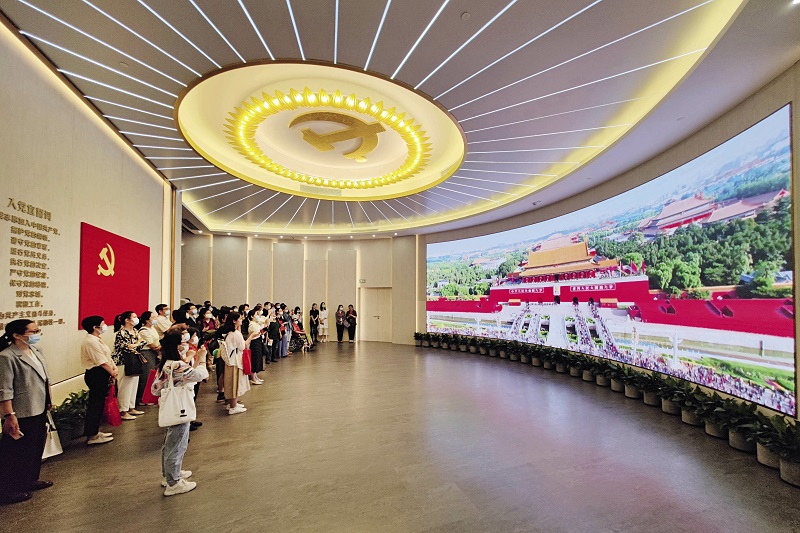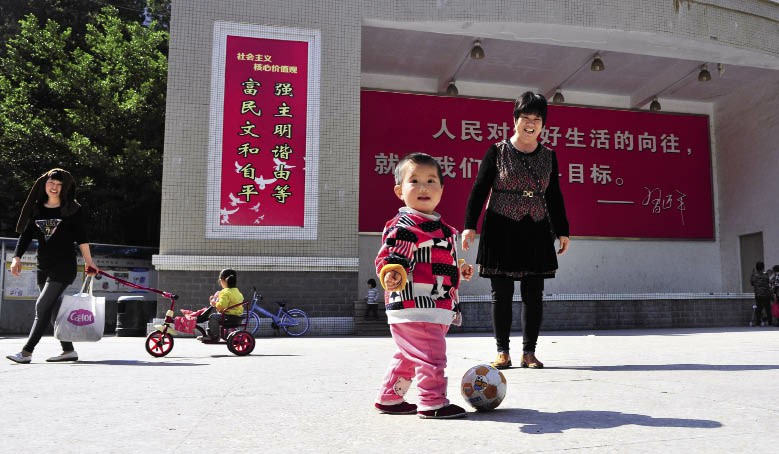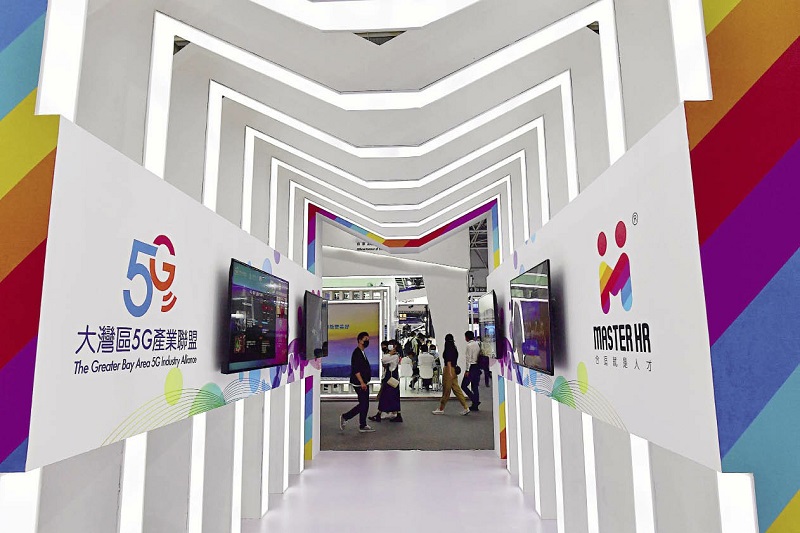The CPC's Glorious Journey of 100 Years

Visitors at the Memorial for the Site of the First National Congress of the Communist Party of China (CPC) that opened in Shanghai on June 3, 2021.
To the Country
Xi Jinping, general secretary of the CPC Central Committee, pointed out that those who lag behind lose out in the end, and self-reliance can be achieved only through development. The CPC's great contribution to the country has been reflected in its complete reversal of the country's tragic fate of enduring impoverishment and oppression which lasted for nearly a century. The nation has embarked on the road to great rejuvenation.
From the Opium War in 1840 to the founding of the People's Republic of China (PRC) in 1949, the country was a semi-colonial and semi-feudal society. Almost all imperialist countries in the world had invaded China, forcing it to pay indemnities, cede territories, open trade ports, and give foreigners extra-legal privileges. Since the founding of the CPC in 1921, the Party had united and led the people to defeat Japanese imperialist aggression, overthrow the Kuomintang's reactionary rule, achieve victory in the new democratic revolution, and establish the PRC. The founding of the PRC heralded the end of the semi-colonial and semi-feudal society of the old China, bringing an end to the state of disunity, as well as abolishing the unequal treaties imposed on China by foreign powers and all the privileges of imperialism in China. This ushered in a new era of China.
With the completion of the socialist transformation in 1956, China established the basic system of socialism, and began a large-scale socialist construction. The country established an independent and relatively complete industrial system and economic system, and achieved breakthroughs in cutting-edge defense-related science and technology such as nuclear technology, artificial satellites, and launch vehicles.
The Third Plenary Session of the 11th CPC Central Committee was convened in late 1978. The Party made a historic decision to implement the reform and opening-up policy, which greatly liberated and developed social productive forces. China has since made great strides to catch up with the trend of the times. It took mere decades to complete the industrialization process that took developed Western countries hundreds of years.
Over the following decades, China established the world's most complete modern industrial system and became the world's second largest economy. The country has made major achievements in strategic hi-tech fields such as high-temperature superconductivity, nanomaterials, life sciences, manned spaceflight, lunar exploration engineering, quantum science, deep-sea exploration, supercomputing, the BeiDou navigation satellite system, large aircraft manufacturing, and high-speed rail. Its infrastructure modernization has leapt to the forefront of the world. The total mileage of high-speed railways exceeds two thirds of the world's total, the mileage of expressways ranks first in the world, and the world's largest 5G coverage network has been built. China's economic strength, scientific and technological strength, national defense capability, and overall national strength have greatly improved.
In October 2017, the 19th CPC National Congress drew a magnificent blueprint for realizing the Chinese dream of the great rejuvenation of the Chinese nation. It proposed to basically realize socialist modernization by 2035 and build China into a prosperous, strong, democratic, culturally advanced, harmonious, and beautiful socialist society by the middle of this century. China is embarking on a new journey of building a modern socialist country in an all-round way and is marching toward the second centenary goal.

Children play freely under the watch care of their family members on Nanling Village Recreation and Sports Central Square in Shenzhen, Guangdong Province on February 15, 2017. The huge poster in the background shows the socialist core values.
To the People
General Secretary Xi Jinping pointed out that the Party comes from the people, is rooted in the people, benefits the people, and serves the people wholeheartedly, which is the fundamental purpose of the Party. Over the past 100 years, the CPC's great contribution to the people has been embodied in the liberation of the people, enabling them to truly become masters of the country, the society, and their own destiny, promoting the well-rounded development of people and the all-round progress of society, and uniting all people to continuously advance toward the goal of common prosperity.
In old China, the people, especially farmers who made up the vast majority of the Chinese population, were increasingly poor, suffered hunger, heat, and cold, and were deprived of political rights. In 1949, the average life expectancy of Chinese people was only 35 years. After the founding of the PRC, under the leadership of the CPC, Chinese people have truly become masters of the country, the society, and their own destiny.
Economically, with the enhancement of productivity, people's living standards have continuously improved. China uses 6.6 percent of the world's freshwater resources and nine percent of arable land to feed nearly 20 percent of the world's population. People have no worry about food and clothing, life-bettering home appliances are widely used, and car ownership is increasing. China has the world's largest middle-income group with over 400 million people. Its per capita gross domestic product (GDP) has continued to grow rapidly and has exceeded US $10,000, achieving a leap from low-income to lower-middle income and to upper-middle income.
Politically, Chinese people enjoy broad, genuine, and effective democracy and participate in political affairs in an orderly manner at all levels and in all fields. Since the commencement of reform and opening-up, socialist democracy has continuously developed, the institutional guarantee for the people to run the country as masters has been continuously strengthened, the strength of socialist consultative democracy has been fully brought into play, the patriotic united front has been consolidated, social governance has been continuously innovated, the practice of law-based governance has been further deepened, and the society has maintained long-term stability.
In terms of people's well-being, education has developed in an all-round way; universal education has exceeded the average level of middle- and upper-income countries, and higher education has been popularized. The employment structure has also been continuously optimized, and the urban registered unemployment rate has remained at a relatively low level. The urbanization rate continues to increase, and the urban permanent population increased to 900 million in 2020. China has built the world's largest social security system covering pension, medical care, subsistence allowances, and housing. To be specific, basic old-age insurance covers nearly one billion people, basic medical insurance covers more than 1.3 billion people, and the average life expectancy has reached 77.3 years.
In terms of ecology, China vigorously promotes the construction of an ecological civilization, provides more high-quality ecological products, and continues to meet the people's growing needs for a beautiful ecological environment. Specifically, China has imposed stringent emission control measures, and thoroughly implemented the water pollution prevention and control action plan as well as the soil pollution prevention and control action plan. The country insists upon benefiting the people through a healthy ecology so that people can gain quality of life and enjoy peace of mind.
In terms of poverty alleviation, China has achieved a miracle in human history. Since the 18th CPC National Congress in 2012, the intensity and impact of targeted poverty alleviation have been unprecedented. Over the past eight years, more than 10 million people have been lifted out of poverty annually, a vast number equaling the population of a medium-sized country. Since the reform and opening-up kicked off, calculated in accordance with the current poverty standards, China has reduced the number of impoverished rural people by a total of 770 million, becoming the country that has lifted the largest impoverished population out of poverty in the world. Being the first developing country to complete the poverty reduction goal of the United Nations Millennium Development Goals, China has contributed more than 70 percent to global poverty reduction and has made great historic achievements in solving the absolute poverty problem that has plagued the Chinese nation for thousands of years.
In short, China has continued to make new progress in educating children, guaranteeing income from work, providing medical care, pension, and housing, delivering support to the weak, making development results more equitable for the benefit of all people. The people's sense of gain, happiness, and security has been continuously enhanced, and the essential requirements of common prosperity have gradually become reflected in real life. The Chinese people have ushered in a great leap from insufficient food and clothing to becoming well-off and prosperous.

Visitors tour the exhibition of the Greater Bay Area 5G Industry Alliance on October 13, 2020.
To the Chinese Nation
General Secretary Xi Jinping pointed out that realizing the great rejuvenation of the Chinese nation is the greatest dream of the Chinese people in modern times. Over the past 100 years, the CPC's great contribution to the Chinese nation is reflected in China's tremendous transformation from a poor, weak country that was bullied by foreign powers to one of independence, prosperity, and strength.
Before the founding of the PRC, imperialist countries derided China as the sick man of East Asia, and arbitrarily bullied and insulted the Chinese people. The CPC led the Chinese people in an unyielding struggle for national independence. The War of Resistance against Japanese Aggression was the first national liberation struggle in which the Chinese people won a complete victory in modern times. The Party played a mainstay role in the war. The war became a historical turning point for the great rejuvenation of the Chinese nation. Since the founding of the PRC, the Party has always resolutely safeguarded the country's sovereignty, security, and development interests.
The CPC put forward the guideline of "peaceful reunification and one country, two systems," and successively resumed the exercise of sovereignty over Hong Kong and Macao. It has always focused on the overall and long-term interests of the Chinese nation, firmly safeguarded national sovereignty and territorial integrity, united all Chinese people, promoted the peaceful development of cross-strait relations, resolutely defeated all attempts for "Taiwan independence," and won a series of major victories in anti-separatism struggles. On issues related to Tibet, Xinjiang, Hong Kong, and the South China Sea, the CPC has resolutely fought against hostile forces at home and abroad and safeguarded the overall interests of the Chinese nation.
All 56 ethnic groups in China together form a large multi-ethnic family. The CPC adheres to Marxist ethnic theory and policy, proceeds from China's reality, implements a system of ethnic regional autonomy, insists that all ethnic groups are equal, and has established an ethnic relationship based on equality, unity, mutual assistance, and harmony. The Party has continuously promoted the sense of Chinese identity, strengthened the exchanges and integration of all ethnic groups, and promoted the unity of all ethnic groups in their endeavor for common prosperity and development.
The Party vigorously inherits and promotes traditional Chinese culture, and promotes its creative transformation and innovative development so that Chinese culture can be carried forward and known to the rest of the world. The national confidence and pride of the Chinese people is constantly increasing.
In the process of leading the people to realize socialist modernization, the CPC has created a miracle of rapid economic development and a miracle of long-term social stability, embarking on a path of modernization with Chinese characteristics. It is the modernization of a large populous country that brings common prosperity for all people, that harmonizes material civilization and spiritual civilization, that allows for harmonious coexistence between man and nature, and that promotes peaceful development. So far, the population of modernized countries is less than one billion. The CPC's better organization and mobilization of 1.4 billion people to build a socialist modern country in an all-round way is of great and far-reaching significance in the history of the development of the Chinese nation and the history of mankind.
To the World
General Secretary Xi Jinping pointed out that the CPC is a party that seeks happiness for the Chinese people and strives for the cause of human progress. Over the past 100 years, the CPC's great contribution to the world is embodied in the realization of the historical transformation of China from a positing of lagging behind the times to catching up with the times to now leading the times, from making a small contribution to human progress to making a far greater contribution.
The revolutionary cause led by the CPC is supported and helped by countries and people that love peace and justice in the world. Meanwhile, the Party is also doing its utmost to support and help the oppressed nations and peoples of the world in their just cause of national independence and liberation. After the founding of the PRC, the country has actively advocated and firmly practiced the Five Principles of Peaceful Coexistence, which has made this principle widely recognized by the international community and an important criterion for handling international relations. For a long time, the CPC and the Chinese people have adhered to the principle of independence, firmly safeguarded the interests of developing countries, insisted that all countries are equal regardless of size, strength or wealth, and resolutely opposed colonialism, hegemonism, and power politics.
Over the past decades, China has held high the banner of peace, development, and cooperation, adhered to an independent foreign policy of peace, upheld the mutually beneficial and win-win strategy, firmly supported the basic norms of international relations, safeguarded international fairness and justice, and actively promoted the construction of global partnership. Since the 18th CPC National Congress, the Party has proposed the building of a community with a shared future for mankind, worked toward a new type of international relations, and advocated the joint construction of the Belt and Road (B&R). The construction of the B&R brings benefits to the people of participating countries and regions.
After the international financial crisis in 2008, China became the stabilizer and engine of global economic growth, and has contributed more than 30 percent to world economic growth for many years. Due to the impact of the COVID-19 pandemic which erupted in 2020, the world economy experienced a severe recession. China's GDP grew by 2.3 percent, becoming the only major economy in the world that achieved positive economic growth, bringing positive spillover effects to the global economy and playing an important role in the stabilization and recovery of the global economy.
China adheres to a common, comprehensive, cooperative, and sustainable security concept, and actively participates in mediation to resolve simmering geopolitical tensions. So far, more than 40,000 peacekeepers have been dispatched, making it the second largest funder of UN peacekeeping operations and the country with the most peacekeepers among the permanent members of the UN Security Council.
In terms of poverty reduction, anti-corruption, peacekeeping, anti-terrorism, climate change, regional hot issues, environmental governance, and effective response to epidemics and natural disasters, China upholds justice, innovates concepts, sets the agenda, seeks common ground while reserving differences, serving as the builder of world peace, a contributor to global development, and the defender of the international order.
For a long time, the CPC and the Chinese people have provided a large amount of free aid and concessional loans to developing countries, provided a large amount of technical, personnel, and intellectual support, and undertaken livelihood improvement projects for a vast number of developing countries.
The success of China's reform and opening-up and the socialist modernization drive has elevated the great banner of socialism with Chinese characteristics in the world, making scientific socialism radiate with strong vitality in China in the 21st century. It provides new options for countries in the world that both want to accelerate development and maintain their own independence, and contributes Chinese wisdom and Chinese solutions to solving the problems facing humanity.
Qu Qingshan is the head of the Institute of Party History and Literature of the CPC Central Committee.
The views don't necessarily reflect those of Qiushi Journal.
























